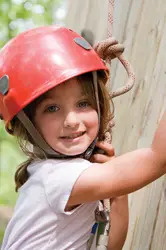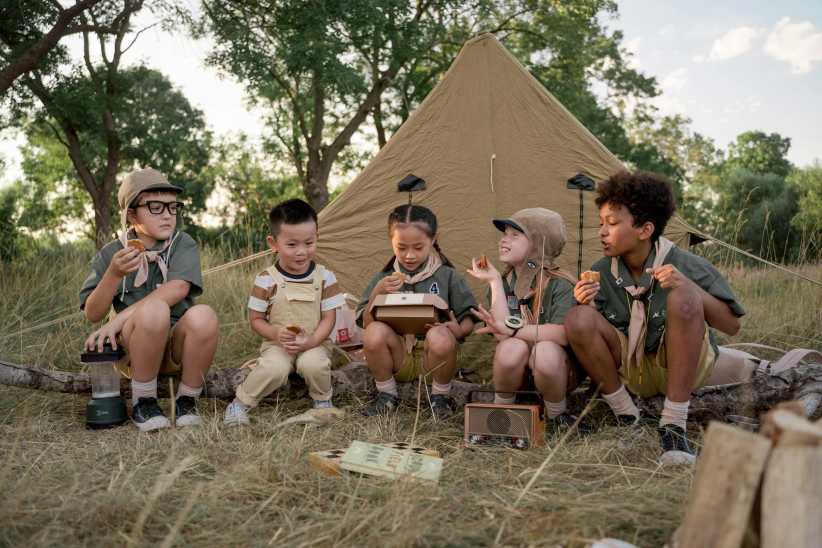Thinking about sending your little one to an all-girls or all-boys camp this summer? We spoke with parents and experts – including the directors of area camps and summer programs – about the single sex camp experience for kids; read on to find out if it’s the right fit for your child.

In the late 19th and early 20th centuries when the first summer camps started to become a part of American culture, they were separated by gender and it was not until the 1940s that coeducational camps started to spring up. Today, there are an equal number of traditional coeducational and single sex camps for families to choose from. And although many experts and parents agree that the single sex atmosphere can provide a unique and enhanced summer experience, is it the right choice for your child?
Excellent Role Models
“We live primarily in a coed world and it’s nice to have some opportunities to be in a single sex environment because it provides a nice contrast to what most children experience throughout the year,” says Dr. Christopher Thurber, a clinical psychologist and author of The Summer Camp Handbook. “Children grow up to be healthier when they have a variety of experiences-some coed and some single sex-and camp can fill that need for a single sex environment.”
Dr. Thurber says that it’s beneficial for children to see strong role models of the same sex who break down what he refers to as “gender role stereotypes.” For example, at an all boys’ camp, boys learn that they can be artistic and affectionate while also being competitive athletes. The counselors are comfortable leading by example and the boys are more comfortable following their lead in the single sex environment. Likewise, at all girls’ camps, girls see female leaders in a position of power who are assertive, confident, and athletic, while also being affectionate, artistic and sensitive.
In single sex camps, children are also less likely to show off or feel self-conscious and shy around their peers or worry that they could be teased. “The most common reason parents send their children to single sex camp is that they think summer is a time when their children can just be with the boys or the girls; it takes the stress out of having the opposite sex there,” according to Barb Levison, Camp Advisor for Tips on Trips and Camps, a free advisory service located in Manhattan. Levison says she receives an equal number of inquiries for both single sex and coed camps, yet many of her clients who have children in single sex schools are looking for a coed summer experience.
 Starry-Eyed Crushes and Sex
Starry-Eyed Crushes and Sex
Many parents fondly remember their first romances that happened at camp, yet this can be another reason they choose to send their children to a single gender camp. “Some parents don’t want their children to have the opportunity to develop romantic relationships; they want them to build friendships and get to know the other campers,” according to Sean Nienow, director at the National Camp Association. Dr. Thurber says that although camp directors usually have control over these situations, there’s generally more romance at coed camps than there is at single sex camps. But for campers who are questioning their sexual orientation, single sex camp isn’t the antidote to sexual experimentation or relationships.
Even if your child isn’t thinking about the other sex, a single gender camp can set the stage for the future. According to Dr. Thurber, although the single sex camp experience can be beneficial for all age groups, the advantages are different. “Early on, it shapes the views that they don’t have to conform to a stereotype, and for the tweens and teens, a partially solidified view of what a boy or girl should be doing gets broken down,” he says. And when parents choose a camp, they’re hoping the philosophy and program will have their child wanting to come back year after year. “Families that choose single sex camps are hoping they’ll find a camp that is not only great for their 9-year-old but also for that child at 13,” says Levison. Even when your child no longer attends camp, the messages they received there can set them up for future success. “Children think they can do anything they want and it’s not constrained by their genders,” says Dr. Thurber.
A Well-Rounded Experience
The same types of activities are generally offered at both all girls’ and all boys’ camps, yet parents may choose an all boys’ camp, for example, for an intensive sports experience in addition to the other traditional camp offerings. “At a well run boys’ camp, there’s going to be just as much arts and crafts, theater, horseback riding and anything else that’s thought of as ‘girls’ activities,” says Dr. Thurber. For boys, there are also noncompetitive camps that don’t place such a strong emphasis on sports but still include all of the same activities. At all girls’ camps, there is a large array of offerings including sports, outdoor and wilderness, the arts, camping and water activities with an added focus on tradition and the importance of friendships. “At these camps, it’s all about making solid, true-blue, for life friends. And most girls wouldn’t trade the all girls’ camp experience for anything because of the depth and strength of the friends they’ve made,” according to Levison who says that many parents believe that these solid friendships for both sexes are made more easily in a single sex environment.
 When the Model Fails
When the Model Fails
According to Dr. Thurber, there are a small number of poorly run camps that do not fulfill their missions and as a result, the experience can be detrimental. Sometimes, the focus on pro girl and pro boy can be taken too far, and peer pressure and competition can become augmented and distorted. For example, an all boys’ camp may develop a negative atmosphere where healthy competition no longer exists, and at an all girls’ camp, appearance and status can take precedence. These kinds of situations can usually be identified through visiting the camps and speaking with families whose children return each year, Dr. Thurber says.
Decision Time
So how do you know if a single sex camp is right for your child? After reviewing all of the information provided by the camp, including brochures, videos, and websites, speaking to the camp director and attending an open house can also help to determine if a particular camp will be a good fit. “It’s more important to find a quality camp that is accredited, has a good reputation, a long director tenure, a high staff and camper return rate and top-notch staff training, and then you can decide between single sex or coed,” according to Dr. Thurber, who says that although parents usually make the final decision, children and their parents should have a discussion about the pros and cons together. “Children who feel that they have taken part in the decisions about camp are much less likely to be homesick.”
Determining what you’re looking for in a camp experience and why you’re looking at a single sex camp, can also help you make the decision. “Depending on those answers, parents will be swayed one way or another or they’ll determine that it really doesn’t matter,” says Nienow. Some single sex camps also have opposite sex sister camps that operate independently but share the same open and close dates and may also host special events together. This arrangement can make it easier for parents to have both son and daughter at neighboring camps and it can also provide some socialization with the other sex. “In most cases, parents are okay with this arrangement where there is some interaction but without the ongoing dynamic; they want the bulk of the experience to be without the other sex,” says Nienow.




















